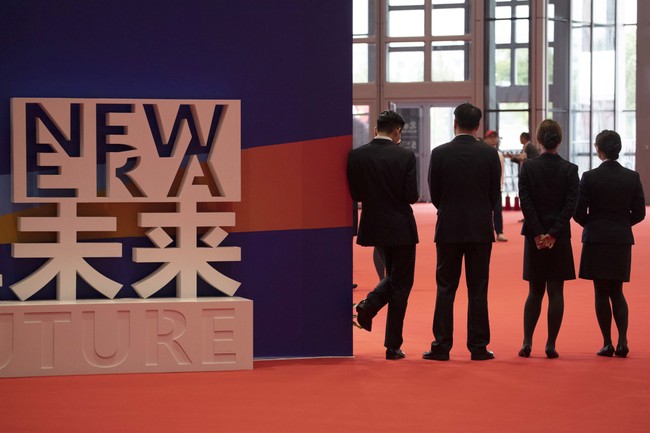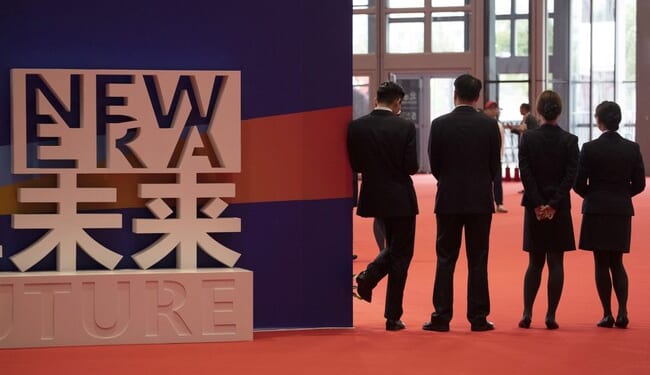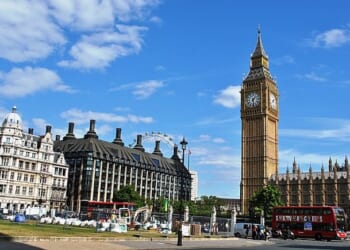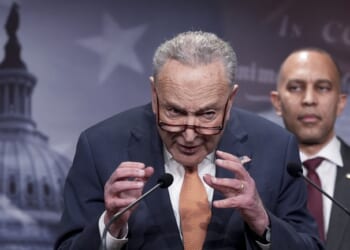
On Friday, I started a regular series that I’ll post at the end of each week called “The New Monroe Doctrine.” (And thank you all for the wonderful feedback I’ve received. It’s encouraging.) My goal with that is to tell you what’s going on in the Western Hemisphere each week as it relates to the United States. Donald Trump and Marco Rubio are making this a priority, thank goodness, and I’m going to cover it every step of the way.
In that article, I mentioned that I was also planning to launch a second, complementary column specifically about China’s influence in our hemisphere and the stories no one is telling. If you haven’t noticed, the MSM doesn’t cover it much, and when they do, it comes across as mostly pro-China. Anti-U.S. Commies gotta stick together, I suppose. So, I’d like to come in and bridge that gap. Based on my months and years of research and my own time spent in Latin America, I have a lot of stories that will anger you about just what all China is doing here, mere miles away from our borders and shores.
For example, last week, I wrote about how China now has control over land in Nicaragua that is roughly the size of or slightly larger than the state of Delaware. They say the purpose is for mining minerals, like gold, but they’re exploiting the region, polluting protected areas, violating local laws, costing the locals their livelihoods, and even interfering with land in Costa Rica along the border — all with dictator Daniel Ortega’s permission, of course. What’s to stop them from, say, building a military base there, 1,000 miles out from Miami? No need to cross the Pacific when the Chinese can set up camp in our own backyard. But you won’t find this in the MSM.
Related: China Is Making a Big Move in Our Own Backyard — but No One Is Talking About It
As I ended that article, “The New Cold War is happening right before our very eyes, and far too many in the U.S. are not paying attention.”
Well, I’m only one girl, but I’m going to use my platform to ensure that as many people as possible are paying attention. So, welcome to my first official installment of “Tracking China in the Americas.” I’ll post it every Tuesday of each week, along with Friday’s “The New Monroe Doctrine,” and I hope y’all will tune in for both. I’m ready to expose the dragon and help the Trump administration bring back security in our region, the only way I know how.
Typically, I’ll do something more focused, but today, I’m going to start with something broad yet positive for the series entry: Bolivia.
As I reported last week, Bolivia elected its first non-socialist president in decades, Rodrigo Paz. He is a free-market, pro-U.S. kind of guy, and I like everything I’ve heard out of him in the last eight or nine days since he won the election.
Learn more about the election here: Bolivia Officially Elects Its First Non-Socialist President in 20 Years
That night, Bolivia’s president-elect spoke with Deputy Secretary of State Christopher Landau, and Rubio later called and congratulated him. Paz, who was in the U.S. already making deals in September, has spoken at length about his desire to repair Boliva’s relationship with our country. His opponent, the more conservative former President Jorge “Tuto” Quiroga, has vowed to join forces and support him for the sake of saving their country from the damage socialism did to it, including leaving it more than $40 billion in debt.
The United States, along with the governments of Argentina, Costa Rica, Dominican Republic, Ecuador, El Salvador, Panama, Paraguay, and Trinidad and Tobago, also released a joint statement, welcoming the change to the region:
The undersigned countries congratulate President-elect Rodrigo Paz Pereira on his election as President of Bolivia. We also commend the Bolivian people for their unwavering commitment to democracy, as demonstrated through their active participation in this electoral process.
On October 19, the Bolivian people made their voices heard in a decisive manner. This outcome reflects the will of the Bolivian people to embrace change and chart a new course for their nation and our region, signaling a departure from the economic mismanagement of the past two decades.
The undersigned countries stand ready to support the incoming administration’s efforts to stabilize Bolivia’s economy and open it to the world, reinforce its democratic institutions, boost international trade and investment, and deepen its engagement with regional and global partners on a wide range of important issues.
We are committed to working closely with President-elect Rodrigo Paz Pereira and his government to advance shared goals of regional and global security, economic prosperity, and growth that benefit all our nations.
We encourage Bolivia’s renewed proactive participation in addressing regional and global challenges.
Shortly after the votes were counted, Paz showed even more solidarity with the common-sense countries in the Western Hemisphere and vowed that he would not invite Ortega, Venezuela’s Nicolas Maduro, or Cuba’s Miguel Díaz-Canel to his inauguration, stating, “We are a democratic country, our condition for engagement is based on democracy. Clearly, they are non-democratic regimes.”
During a recent interview with Rachel Campos-Duffy on Fox Noticias, Paz said that while campaigning, he asked his citizens if they wanted to partner with the U.S., and the response was an overwhelming yes. “Bolivia wants change, it wants a new era. Bolivia wants to be in the world and for the world to come to Bolivia. And one of the most important conditions is this new relationship with the United States and with President Trump’s administration,” he said.
He’s made numerous other positive remarks during recent speeches. “In 2008, Bolivia exported $500 million to the American market, generating 40,000 jobs. In 2009, it dropped to exporting $23 million and 1,000 jobs, that is treason to the homeland,” he said. He’s reportedly planning a trip to the U.S. in the next week or two.
Paz has also said, “What puts food on the table is the right to work, strong institutions, legal security, and respect for private property.” Right on.
Even better is that the Bolivarian Alliance for the Peoples of Our America (ALBA), an anti-American organization founded by Fidel Castro and Hugo Chavez in 2004, which is now basically just a socialist version of a good ol’ boys club for Maduro, Ortega, Diaz-Canel, and a handful of small Caribbean nations, kicked Bolivia out of its alliance on Friday. Paz had already expressed his desire to unjoin, so the feeling was mutual. Dismantling ALBA has been a goal for many in the U.S., and one of the dominoes just fell. It’s a beautiful thing.
But that’s the good news. While many of us in the States and throughout the Hemisphere are thrilled that yet another country has moved to the right and away from socialism and tyranny and are excited to work with it, China isn’t willing to take its grubby hands off of Bolivia just yet. On Friday, four days after the U.S. and other countries released their statement, Xi Jinping issued his own congratulatory statement. Read it carefully:
On October 24, 2025, President Xi Jinping sent a congratulatory message to Rodrigo Paz Pereira on his election as President of the Plurinational State of Bolivia.
Xi Jinping pointed out that China and Bolivia are good friends and good partners. Since the establishment of diplomatic relations 40 years ago, China-Bolivia relations have maintained a sound momentum of development. The two sides have always understood and supported each other on issues related to their respective core interests and major concerns, achieved fruitful outcomes in practical cooperation across various fields, and fostered deep friendship between the two peoples. China highly appreciates Bolivia’s firm commitment to the one-China principle. Xi Jinping said that he attaches great importance to the development of China-Bolivia relations, and is willing to work with President-elect Rodrigo Paz Pereira to steer the China-Bolivia strategic partnership to new heights and deliver greater benefits to the two peoples.
Sounds a bit like nerves or maybe even a thinly veiled threat to me. As far as I know, Paz hasn’t responded to this publicly, but the question is, what does Bolivia and China’s “strategic partnerships” look like going forward? Latin America is slowly drifting in the right direction — away from socialism — one country at a time. Bolivia is a prime example of this, but how does its leadership remove itself from Beijing’s tight fist? I mean, a significant portion of that $40 billion debt Paz mentioned is owed to you-know-who. Bolivia is caught in a Chinese debt trap.
For years, under Movimiento al Socialismo (MAS) rule, particularly under Evo Morales, Bolivia essentially sold its soul to China, making it its top trading partner, taking out billions of dollars of debt and loans, and allowing it to come in and “invest” or exploit its infrastructure, particularly in the area of mining. Years of socialist rule aside, Bolivia is attractive because it’s home to the largest lithium reserves in the world. Its geographic location is also appealing. The landlocked country sits in the middle of the continent and bridges a gap between the east and the west.
Take trade, for example. In 2024, China had “overtaken the U.S. as Bolivia’s main trading partner, at a rate of about five-to-one. As of August of this year, “China exported $91.6M to Bolivia, marking a 16.7% increase from August 2024, when trade amounted to $78.5M,” according to the Observatory Economic Complexity (OEC).
Or the lithium exploitation: Bolivia is home to an estimated 23 million tons of the mineral. In 2023 and 2024, the country signed $2 billion deals with Russia and China to establish extraction facilities at the Uyuni Salt Flat. However, those deals are currently paused by a Bolivian court due to complaints from indigenous groups. Paz has said he’d prefer to work with U.S.-based companies instead. Will he be able to nix them?
Bolivia is heavily tied up in China’s sketchy Belt & Road Initiative — though I suspect that will change ASAP — which means China has its heavy hand in the country’s infrastructure, and Bolivia often repays it with concessions and access. It’s purchased Chinese military equipment, including assault rifles and artillery, while China has provided Bolivia with riot gear and military vehicle donations to help combat protesters. China even has satellite ground stations in Bolivia.
I could go on, but I don’t want to get too into the weeds today. China is heavily embedded in the South American country, and it’s not going to go down without a fight. Thankfully, Paz has made it clear that he’s not interested in working with China, or Russia or Iran, for that matter, and plans to stick with his allies in the West.
If he’s successful, Bolivia could be a shining example for the rest of the hemisphere of what’s waiting when they embrace democracy and Western values. It’ll be interesting to watch.
These are the stories the MSM won’t report, but we will. However, we can only do it with your help. When you become a PJ Media VIP member, it helps us stay in business. It helps us keep reporting on the things no one else will.
Right now, we’re running a Schumer Shutdown Sale. Use promo code POTUS47 to get 74% off your VIP membership. That’s just $12.74 for the entire year. Click here to get started.











